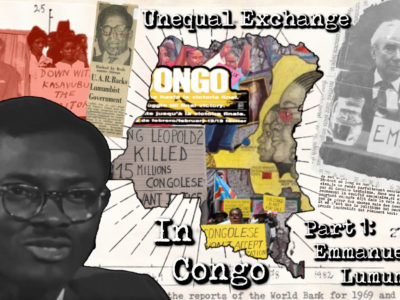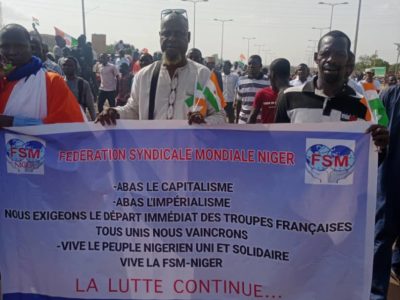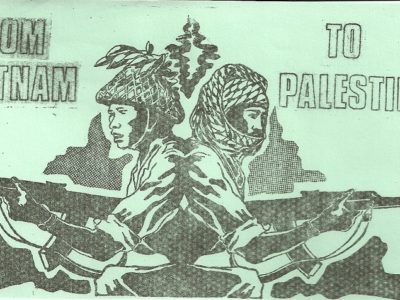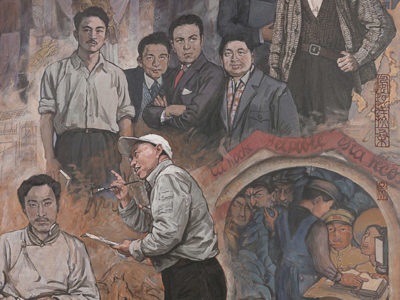Israel is a settler-colonial state. This is a key concept to understand the position of Israel in the world-system and its brutal behavior against the Palestinian population. What is a settler-state, and what are the implications of being a settler state? To answer these questions, we must start with the history of settler-colonialism in general.
The history of settler-colonialism
The idea of European emigration, and the establishment of a state outside Europe where Europeans could settle, is not unique to Zionism. It was a general tendency in the 18th, 19th, and the beginning of the 20th century in Europe. Settler-colonies are distinguished from those colonies that were aimed at the extraction of value for the benefit of the colonial power. The Settlers had their own agenda; they were settlers for their own benefit, not for returning anything back to the old home country. Marx referred to them as “colonies properly,” [1] involving expropriation of the land and exterminating or expelling the original population.[2]
About 70 million people emigrated from Europe in the late nineteenth and early twentieth centuries. Considering that about 400 million people were living in Europe in 1900, this amounted to 17 percent of the population: 36 million went to the USA, 6.6 million to Canada, 5.7 million to Argentina, 5.6 million to Brazil, and smaller numbers to Australia, New Zealand, Rhodesia, South Africa, Kenya, Algeria, and Palestine.[3] Today, the population of European descendants in the old settler colonies is bigger than that in Europe itself.
Emigration served as a safety valve to reduce social unrest as it reduced the “reserve army of labor”. Cecil Rhodes, a pivotal figure in the colonization of southern Africa, explained in 1895:
“I was in the East End of London (a working-class quarter) yesterday and attended a meeting of the unemployed. I listened to the wild speeches, which were just a cry for ‘bread! bread!’ and on my way home I wondered over the scene, and I became more than ever convinced of the importance of imperialism… My cherished idea is a solution for the social problem, i.e., in order to save the 40,000,000 inhabitants of the United Kingdom from a bloody civil war, we colonial statesmen must acquire new lands to settle the surplus population, to provide new markets for the goods produced in the factories and mines. The Empire, as I have always said, is a bread-and-butter question. If you want to avoid civil war, you must become imperialists.”[4]
In the colonies, impoverished European workers and peasants turned into settlers. The success of the settler state was based on the dispossession and exploitation of the Indigenous population.
Settler colonies can be divided between colonies where the indigenous population was primarily driven off their lands (for example, in North America, Australia, and New Zealand) and colonies where the indigenous population also were an important source of exploitation in plantations, mines, and so on, as in South Africa, Rhodesia, and Algeria. Apart from being driven from their lands, the local population was also forced to work in agriculture and mining. European settlers and locals were separated by apartheid systems. The obvious difference between the living conditions of two communities living on the same territory created strife of particular intensity.[5] The armed conflict leading to the liberation of Algeria in the 1960s cost one million lives.
The US Settler-state
Settlers in the former category of colonies were primarily demanding land. The original population was not asked for permission, they were displaced. A prime example is North America. Of the roughly ten million indigenous people living in North America when colonization began, less than three hundred thousand remained in 1900, most of them confined to reservations.[6] The indigenous people had not surrendered their land, their resources, and their culture without resistance, but were repressed by brute force. The European settlers saw them as parasites to be exterminated.
The concept of “extermination”, meaning expulsion and extirpation, aimed at the complete removal of a people is connected to settler-colonialism.[7] In the early eighteenth century, the colonial government paid generous rewards for the scalps of Native Americans. The exact amount depended on factors such as gender and age, with the goal being to make the violent oppression of indigenous people as effective as possible.[8] Marx describes it in Capital:
“…by decrees of their assembly set a premium of £40 on every Indian scalp and every captured redskin: in 1720 a premium of £100 on every scalp; in 1744, after Massachusetts Bay had proclaimed a certain tribe as rebels, the following prices: for a male scalp of 12 years and upwards £100 (new currency), for a male prisoner £105, for women and children prisoners £50, for scalps of women and children £50.”[9]
It is astonishing that white America—through pulp fiction and Hollywood films—was able to turn scalping into a supposedly indigenous practice. In reality, scalping was primarily used by settlers.[10]
The colonial government also resorted to biological warfare. According to the historian David Dixon, “it was deliberate British policy to infect the Indians with smallpox.” It was done by handing them blankets, silk shawls, and linen as a sign of “goodwill” – all of them infected with smallpox [11] The genocide suffered by the indigenous population was no accident, but was a deliberate act by European settlers and their political representatives. If these peoples didn’t surrender their lands voluntarily, war was the only answer. In 1790, Secretary of War Henry Knox ordered the US army to “extirpate, utterly, if possible” an Ohio gathering of Native Americans who had rejected demands to surrender their lands.[12] President Jefferson, in 1807, noted in a letter on indigenous resistance: “[I]f ever we are constrained to lift the hatchet against any tribe, we will never lay it down till that tribe is exterminated, or driven beyond the Mississippi…and if they will kill some of us, we shall destroy all of them.”[13] Those executing the political orders shared the same attitude. Most infamous is General Philip Henry Sheridan’s statement that “the only good Indians I ever saw were dead.”[14] In his book “The Winning of the West”, the American president (1901-9) Theodore Roosevelt (1858-1919) expressed the same exterminist views of settler colonialism:
“The most ultimately righteous of all wars is a war with savages, though it is apt to be also the most terrible and inhuman. The rude, fierce settler who drives the savage from the land lays all civilization under a debt to him. American and Indian, Boer and Zulu, Cossack and Tartar, New Zealander and Māori—in each case the victor, horrible though many of his deeds are, has laid deep the foundations for the future greatness of a mighty people.”[15]
This attitude is also reflected in the constitution of the US, in the famous “Second Amendment”:
“A well-regulated Militia, being necessary to the security of a free State, the right of the people to keep and bear Arms, shall not be infringed.”[16]
As settlers poured over the US, squatting on Indigenous lands, the Second Amendment reflected the dependence on arming the settlers, not just in terms of a right to bear arms, but also as a requirement to bear arms, which was crucial to the integrity of the state and the conception of security. The violent appropriation of land by white settlers was seen as an individual right in the Second Amendment of the U.S. Constitution.[17]
A survey states that US civilians account for an estimated 393 million (about 46 percent) of the worldwide totals of civilian-held firearms.[18] Yet only a third of the population own those guns, an average of eight each, A great majority of this minority of gun owners are white men who are descendants of the original settlers (or pretend to be). The continuing significance of that “freedom” specified in the Bill of Rights reveals the settler-colonialist cultural roots of the United States that appear even in the present as a sacred right.[19] Gun proliferation and gun violence today are among its legacies.
We see the same characteristics in Israel. The settlers in the West Bank have formed armed militias, which drive Palestinians off the land. In a cabinet meeting on 29.1.2024, Netanyahu said the government is working to accelerate the licensing of weapons to Israeli civilians and rescue services, taking steps to “strengthen settlements”, and Israeli police were also encouraging those with existing licenses to carry their guns.[20]
The Israeli settler-state
How does the history of settler colonialism relate to the Zionist project in Israel? The Austrian Theodor Herzl (1860-1904), the founder of Zionism, saw the establishment of a settler state in Palestine as the solution to the persecution of Jews, in line with the colonial thinking in Europe at the time. Chaim Weizmann, later president of the World Zionist Organization and to become the first president of Israel, told a Berlin audience in March 1912:
“Each country can absorb only a limited number of Jews if she doesn’t want disorders in her stomach. Germany already has too many Jews.” [21]
Before the 1930s, Zionism did not enjoy much support among European Jews. However, the intensified antisemitism in Europe – not only Germany – up through the 1930s, gradually changed the attitude amongst Jews. Neither did the Zionist settler project have the support of states before the Second World War. Palestine was a British colony; they were not against Zionist settlement, but opposed to the idea that Palestine should become a Zionist state. The Second World War changed the situation, as the Holocaust and the guilty consciences of many Europeans turned into support for the establishment of the Israeli state. The first wave of forcible expulsion was in 1948 called the Nakba – “catastrophe” in Arabic – where more than a million Palestinians were displaced. This has been followed up by the continuous expulsions of Palestinians from their land. The current war in Gaza is in line with the exterminism inherent in the logic of the settler-state.
The relationship between the US and Israel
The US saw the potential of an allied clone in the Middle East to protect the interests of developing US neocolonialism. Jews who chose to solve the problem of European antisemitism by emigration to Palestine, to join the Zionist project, became part of US imperialism in the Middle East. An anachronism, Israel became the last European settler-colonial project, in an era when decolonization was on the agenda in the rest of the world.
The State of Israel is a distinct settler-colonial project with its own interests, while at the same time it serves a certain purpose for US imperialism. The founder of Zionism, Theodor Herzl, was already writing in 1896 in The Jewish State, of playing this role vis à vis the Ottoman Empire:
“There (in Palestine) we shall be a sector of the wall of Europe against Asia, we shall serve as the outpost of civilization against barbarism.” [22]
After the Second World War, this way of thinking was transformed into a story of the West struggling against a communist-inspired nationalism in the region, such as Nasser in Egypt, and then it was the Western “Judeo-Christian” culture battling “Arab/Muslim international terrorism”. Today the “barbarian” influence that must be blocked is Russian and Chinese. As such, the importance of the struggle for Palestine extends beyond its small geographic area and limited economic significance.[23]
Israel serves as a “US battleship” situated in the landmass of the Middle East. It secures the US interests in the vast oil resources in the region. Cheap oil was the energy resource that fuelled the post-war development of capitalism. Furthermore, the Middle East is of geopolitical importance as the gateway between Asia and Europe. As Asia in the past decades became the “factory of the world”, the Middle East was turned into a permanent war zone, to secure US hegemony. The importance of geopolitical control of the region became obvious when the Suez Canal was blocked for six days in 2021 when a container ship ran aground. Another example is the effect of “Houthi” (Ansarallah) attacks on ships carrying cargo for Israel in the Red Sea, in solidarity with the Palestinian struggle. The disruption to global trade for only a short period has had huge consequences for the supply of industrial goods from Asia.
This is why the conflict around Palestine is so intense and has lasted so long. It is not just about the creation of a Palestinian state. It is about the existence of the Israeli settler state, placed as a fortress in one of the most important geopolitical locations in the world, the pivot between Asia, Africa, and Europe. But it is much more than this. The dismantling of the Israeli colonial project could also dismantle the historical legitimacy of European settler-colonialism as a “civilizing” project. This is not only Israel’s ideology, but also the self-perception of Europe, and settler-colonialism as an ideology is still part of the mentality in the US, Canada, Australia, and New Zealand.[24]
In the current global class struggle, the Palestinian liberation struggle represents the proletariat of the global South’s effort to overturn the weight of history. The success of this struggle depends on a shift in the balance of power between US-led imperialism and the Global South – and it is on the way, marking a global historical turning point in the coming decade. The US is still militarily dominant, but no longer rules in terms of the global economy and finance. In the 1970s, the Third World demanded a “new world-order” in vain. Today, the Global South is building it. US hegemony is in decline, and the Global South is on the rise. As Israel is demolishing Gaza, killing tens of thousands, tens of millions of people all around the world are protesting, a resistance that will grow. Israel may think they will win the battle of Gaza, but they are losing the war. The Palestinians are at the moment on the frontline of a much greater struggle over a new world order, and the Palestinian question will find its solution in that context.
Notes:
[1]The term “settler colony” has only been used more recently. Karl Kautsky, for example, wrote about “work colonies” (Karl Kautsky, Socialism and Colonial Policy, Chapter 4).
[2] Marx, Karl 1867) Capital, vol. 1, page 917. Penguin Books, London 1976.
[3]Teresa Hayter, Open Borders. London: Pluto Press (2000), p. 9.
[4]. Quoted from Lenin, V.I. (1917), “Imperialism, the Highest Stage of Capitalism.” In: Lenin (1971), Collected Works, Volume 22. Moscow: Progress Publishers (1972), pp. 256–257.
[5]. Robert Davis, “The White Working-Class in South Africa.” New Left Review, no. 82, pp. 40–59.
[6]. Harold E. Driver, Indians of North America. Chicago: University of Chicago Press (1968), p. 604.
[7] Monthly Review (2024) Notes from the editors. Monthly Review, February 2024, Volume 75 no. 9. New York 2024.
[8]. See, for example, Melville Madison Bigelow, The Acts and Resolves, Public and Private, of the Province of the Massachusetts Bay. Boston: Wright & Potter, 1869 pp. 594–595.
[9]. Karl Marx, “Part VIII. Chapter Thirty-One: Genesis of the Industrial Capitalist.” Capital, Volume I. Moscow: Progress Publishers, 1962.
[10]. John Grenier, The First Way of War: American War Making on the Frontier, 1607–1814. New York: Cambridge University Press (2005), p. 13; Peter Silver, Our Savage Neighbors: How Indian War Transformed Early America. New York: W.W. Norton & Company (2009), pp. 161–190.
[11]. David Dixon, Never Come to Peace Again: Pontiac’s Uprising and the Fate of the British Empire in North America. Norman: University of Oklahoma Press (2005), pp. 152–155.
[12]. Quoted from American State Papers, “Secretary of War to Josiah Harmar, June 7, 1790.” Indian Affairs, vol. 1. Washington DC: Gales and Seaton (1832), p. 97.
[13]. Thomas Jefferson, “Letter from Thomas Jefferson to Henry Dearborn, 28 August 1807”. Founders Online, National Archives.
[14]. Dee Brown, Bury My Heart At Wounded Knee: An Indian History Of The American West. New York: Henry Holt and Company, 1970 p. 147.
[15] Roosevelt, Theodore (1889) The Winning of the West, vol. 3, page 45. G. P. Putnam and Sons, New York. 1889.
[16] Second Amendment | Wex | US Law | LII / Legal Information Institute (cornell.edu)
[17] Dunbar-Ortiz, Roxanne (2018) Settler Colonialism and the Second Amendment. Monthly Review Vol. 69, No 8, January 2028.
[18] Karp, Aaron (2018) Estimating Global Civilian held Firearms Numbers. Small Arms Survey, 2018 Geneva Switzerland.
[19] Dunbar-Ortiz, Roxanne (2018) Settler Colonialism and the Second Amendment. Monthly Review Vol. 69, No 8, January 2028.
[20] Haaretz, Israeli Daily Newspaper. 29.1.24
[21] Mortimer, Edward (1984), “Contradiction, Collusion and Controversy.” An introduction to Lenni Brenner, Zionism in the Age of the Dictators. Croom Helm, London 1984.
[22] Herlz, Theodor (1896), The Jewish State. Online https://www.jewishvirtuallibrary.org/quot-the-jewish-state-quot-theodor-herzl
[23] Monthly Review (2024) Notes from the editors. Monthly Review, February 2024, Volume 75 no. 9. New York 2024
[24] Kadri, Ali (2024) Ali Kadri interviewed by Karin Leukefeld (unpublished)










